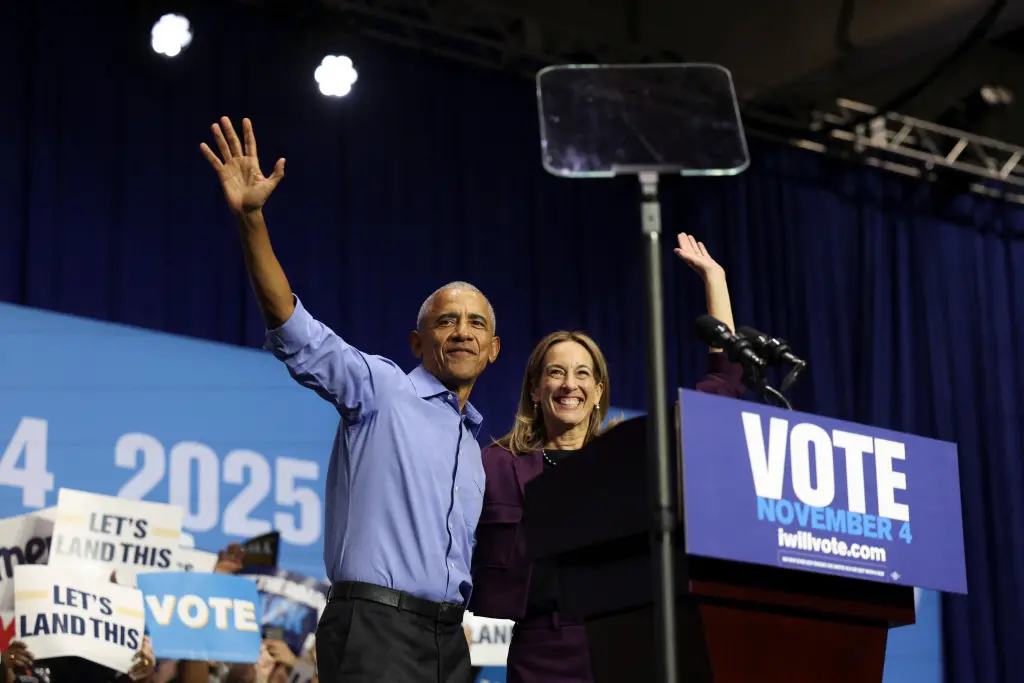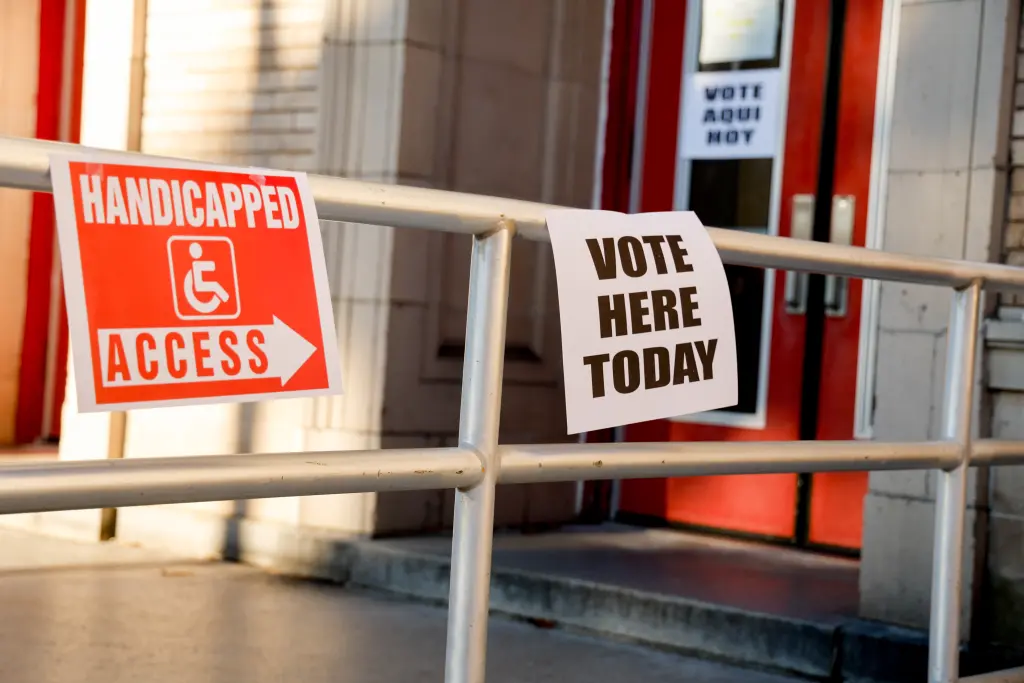Mikie Sherrill Defeats Jack Ciattarelli to Become New Jersey’s Next Governor After Making Her Campaign a Direct Rejection of Trump-Era Politics
Mikie Sherrill has officially made history in New Jersey. The former Navy helicopter pilot, congresswoman, and federal prosecutor has been elected as the state’s next governor, defeating Republican Jack Ciattarelli in a decisive win that rippled through national politics. The Associated Press called the race for Sherrill at 9:22 p.m., sealing a landmark victory that gave Democrats a rare third consecutive term in the statehouse — the first time since the early 1960s.

From the start, this wasn’t just another governor’s race. Sherrill’s campaign became a referendum on Donald Trump and the political climate he continues to influence. By making her candidacy a direct rejection of Trumpism — and by framing Ciattarelli as a candidate too closely aligned with the former president — Sherrill tapped into the same suburban and independent voter base that had once carried her to Congress. The strategy worked. It energized moderate Democrats, drew independents who had drifted away from Trump, and even peeled off some Republicans disillusioned by the direction of their party.
Sherrill’s victory marks a major milestone in New Jersey politics. The 52-year-old Democrat built her career on public service and pragmatism, positioning herself as both a reformer and a stabilizing hand. As a Navy veteran and former federal prosecutor, her résumé carried an air of competence that resonated with voters who wanted effective leadership over partisan theatrics. At rallies, she often emphasized the values of integrity and accountability — a message she contrasted sharply against what she described as “the politics of chaos and grievance.”

Her opponent, Jack Ciattarelli, had entered the race with significant name recognition and the backing of national Republican figures, including Trump himself. Ciattarelli’s campaign leaned on local identity, portraying him as a homegrown New Jerseyan with deep roots in the state. But Trump’s support proved to be a double-edged sword. While it fired up the conservative base, it alienated moderate suburban voters, particularly women, who make up a crucial slice of New Jersey’s electorate. As one analyst noted, “In New Jersey, Trump’s endorsement may win you headlines — but not necessarily votes.”
Throughout the campaign, Sherrill struck a disciplined balance between local and national themes. She spoke about New Jersey’s affordability crisis, high property taxes, and infrastructure woes, while also reminding voters that “leadership reflects values.” She accused Ciattarelli of aligning with Trump’s “extremism” and argued that his policies mirrored the same divisive tone that had polarized the nation. Her slogan — “Forward Together” — became both a promise and a warning: progress required rejecting regression.
Political observers say Sherrill’s approach exemplifies how Democrats can navigate the post-Trump era. Instead of running away from national politics, she leaned into them — not to relitigate the past, but to frame her opponent as an extension of it. The move echoed President Biden’s 2020 strategy, yet Sherrill localized it, arguing that Trump’s influence in New Jersey politics threatened the state’s progress on issues like women’s rights, education, and climate resilience. Her campaign messaging, heavily focused on inclusion and stability, was reinforced by targeted social-media outreach and an aggressive ground game in suburban counties like Morris, Bergen, and Somerset.

Behind the scenes, top Democrats saw Sherrill as a rising star — and their investment reflected that. Party heavyweights, including Governors Kathy Hochul and Gavin Newsom, recorded endorsements, while former President Barack Obama headlined a virtual fundraiser. The Democratic Governors Association poured in millions in the final stretch, focusing on turning out younger and first-time voters. That coordinated push paid off, as early-voting data showed a surge in turnout in traditionally moderate districts that broke heavily for Sherrill.
Ciattarelli, meanwhile, struggled to expand his appeal beyond the Republican base. His message of fiscal conservatism resonated in parts of South Jersey, but his rhetoric on national issues — particularly his reluctance to distance himself from Trump’s false claims about the 2020 election — haunted him. Sherrill’s campaign ads seized on those moments, airing clips of Ciattarelli at pro-Trump rallies juxtaposed with her own record of service and independence. The contrast was stark and, ultimately, decisive.
When the results rolled in, the margin wasn’t razor-thin. Sherrill carried the race comfortably, winning by several points across a coalition that mirrored New Jersey’s demographic complexity: suburban professionals, working-class families, college-educated women, and younger voters who had become politically active after 2020. Her acceptance speech was equal parts gratitude and resolve. “Tonight isn’t about defeating someone,” she told cheering supporters in Montclair. “It’s about proving that hope, integrity, and competence still matter.”

The significance of her win extends beyond Trenton. It comes at a moment when Democrats are searching for a formula to keep swing states competitive ahead of 2026. Sherrill’s blueprint — military service, moderate tone, local focus, and a clear moral contrast to Trumpism — offers a template that party strategists will study closely. Her campaign manager described it succinctly: “We didn’t run from Trump. We ran toward accountability.”
Still, Sherrill’s path forward will be anything but easy. She inherits a state grappling with serious financial and social challenges. Property taxes remain among the highest in the nation, public-transit systems need modernization, and housing affordability continues to drive residents to neighboring states. Voters expect solutions, not slogans. Analysts warn that Sherrill will have to deliver measurable progress quickly to maintain her popularity — especially in a political climate where attention spans are short and patience even shorter.
Her first months in office will likely focus on what she calls “kitchen-table governance” — practical policies designed to ease daily burdens. Her transition team has already hinted at plans to freeze utility rates, expand child-care support, and launch a bipartisan task force on transportation reform. Whether those plans can survive the realities of budget constraints remains to be seen, but her early messaging suggests a governor determined to lead with results rather than rhetoric.
Nationally, Democrats are celebrating. Sherrill’s win, coupled with recent victories in other blue-leaning states, suggests that moderate, message-disciplined candidates still hold the key to victory in post-Trump America. For Republicans, it’s another reminder that Trump’s lingering influence remains a double bind — energizing their base but shrinking their map. Ciattarelli’s defeat underscores a truth many within the GOP quietly acknowledge: suburban voters are increasingly wary of candidates who won’t clearly separate themselves from the former president’s shadow.

For Mikie Sherrill, however, the moment feels personal. Standing before supporters late Tuesday night, she reflected on her journey from Navy pilot to governor-elect. “When I first took an oath to serve this country, I learned that leadership is not about ego — it’s about duty,” she said. “Tonight, New Jersey reminded me that duty still wins.”
As confetti fell and the crowd roared, it was clear this was more than a local win. It was a signal of where the political winds may be blowing — away from chaos, toward competence, and toward candidates who reflect both conviction and calm. For now, Sherrill’s victory stands as a defining moment for Democrats in 2025 — and perhaps a preview of what’s to come in 2026.


